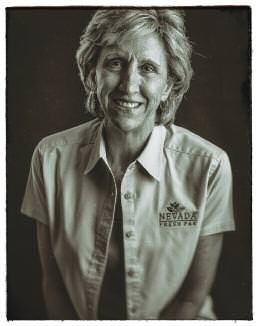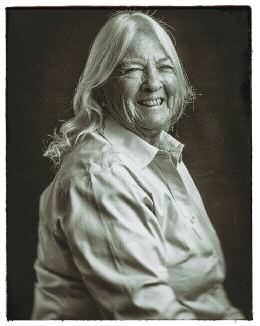feature
FACES OF NEVADA ORGANICS
Changes include the emergence of a new certifying group.
WRITTEN BY KRIS VAGNER
PHOTOS BY CHRIS HOLLOMAN
Steve (not pictured) and Marcia Litsinger are owners and farmers at Churchill Butte Organics in Stagecoach. Marcia has been one of the only independent organic inspectors in Northern Nevada. Both Steve and Marcia have been part of every major effort to establish a market for locally grown organic produce — from instructing classes through the River School in Reno to helping establish area farmers’ markets and forming the Great Basin Community Food Co-op in Reno.

One day, Amber Sallaberry and her sister Nicole got tired of riding their bikes all the way down South Virginia Street to buy organic produce at Wild Oats Market. They decided to bring healthful foods and organic produce closer to Downtown Reno. In 2005, they started a home-based buying club, which evolved into the Great Basin Community Food Co-op, a full-service natural foods market that specializes in locally and organically produced foods. Sallaberry is the co-founder and general manager.

Kunall Patel owns Davidson’s Organic Teas in Sparks, the first organic tea company in the United States. Davidson’s celebrates its 40th anniversary this year.
“For a company that has more than 300 organic-certified products, this is a complete nightmare with significant expense,” says Patel of last year’s closure of the state’s organic certification program. “However, it’s been a blessing in disguise since we are now able to re-certify with another organic-certifying agency, making our products eligible for sale in European markets.”

“We sell directly to restaurants, and most of them are within a two-mile radius of the gardens,” says Craig Frezzette of his City Green Gardens in Reno. “Talk about a small carbon footprint!”
While switching to a new organics certifier presents industry-wide challenges, the way Frezzette sees it, the transition comes with a silver lining: “For one, we will be working with local people who have been involved in the Nevada organic program since its inception. This allows us to have access to their knowledge and assistance at a grassroots level, not at a government level.”
Frezzette’s goal as an organic farmer: “Creating a balanced ecosystem in the gardens, working along with nature instead of against her.”

“Our grandpa is a Basque sheepherder, and Dad grew up on a ranch,” says Nicole Sallaberry, who helped found and currently co-manages the Great Basin Community Food Co-op in Reno with her sister Amber. “We grew up eating McDonald’s and drinking Pepsi, but we learned on our own that good food made us feel a lot better.”
“I think local organic farming and producing is important to our community because of the quality of the food that we’re providing. It is top quality,” she says.
Sallaberry manages the Co-op’s DROPP (Distributors of Regional and Organic Produce & Products) program, which connects growers directly with organizations such as local restaurants, schools, and casinos.

Growing organically is more expensive than growing conventional, mainly because of the labor. “My brother (David) and his team that grow the produce, it’s amazing to see all the extra steps they take, hand weeding, barriers for rodents, every little thing,” says Denise Peri, who manages sales for Peri & Sons Farms and Nevada Fresh Pak in Yerington.
To Peri, it’s worth the extra effort. “It’s really very simple,” she says. “Take care of yourself, take care of others, take care of the earth.
“People are caring about knowing where their food comes from, how it’s produced. Being part of that is a great feeling. I’m really proud of that. I had someone tell me one day, ‘Oh, my gosh, you look so healthy!’ I said, ‘I am what I eat.’”

Fred Alejo is vice president of sales with High Quality Organics in Reno, and Lisa Terry is the sales manager. High Quality is the largest North American provider of wholesale organic ingredients, such as herbs, spices, dehydrated vegetables and fruits and teas.
The face of Nevada organics is changing, which likely means growing pains in the short run — and growth in the long run.
In June 2015, officials at the Nevada Department of Agriculture voted to discontinue its organic certification program, citing an annual $65,000 deficit. Department managers gave organic producers until June 2016 to find a new certifier.
In theory, producers could call on one of about 100 out-of-state certifiers to maintain their organic certifications, which must be renewed annually. But that would add additional cost to an already expensive way of doing business. Organic producers pay more for necessities such as organic feed, minerals, and plant starts. Dependence on out-of-state inspectors would add travel expenses to that list.
Seed of an idea
In July, a group of farmers and other producers in cowboy boots, jeweled sandals, polished oxfords, and hiking shoes met in a conference room at the USDA Farm Service Agency in Reno. Despite their differences in footwear, the group voted unanimously to form a new, Nevada-based nonprofit organization to certify organic producers and handlers, Basin and Range Organics. Members aim to have the system up and running by June, and they agreed that they could meet that deadline.
“We’re a pretty tight group,” says Marcia Litsinger of Churchill Butte Organics in Stagecoach, Nev. “Most of us have known each other for years. We work together. I can even read what Rob (Holley, of Dayton’s Holley Family Farms) is thinking just by looking at his face. We’ve been friends for so long.”
Starting anew
In addition to avoiding out-of-state inspectors’ travel fees, the nonprofit status means that group leaders can pursue business and community-development grants to keep the program affordable. In October, Basin and Range Organics received a grant from the Healthy Communities Coalition to fund the hiring of a new program administrator, Ben Rush.
One future goal is to offer certification of organic livestock, which has not been available under the state-run program. This would mean Nevada-grown organic meats, eggs, cheeses, and honey eventually may be available to consumers.
According to Clinton Koble, executive director of the Farm Service Agency in Nevada, having an in-state certification process also means having access to “technical service providers,” who can help producers plan and maintain their organics programs. This would be an especially helpful resource for new growers and manufacturers.
“There’s a strong interest by younger alternative farmers getting into organics,” Koble says.
He added that even among this tight-knit community, new producers will be a welcome change.
“Demand for organics far outstrips its supply,” he says.
Kris Vagner writes about food, drinks, culture, and arts for local and national publications.
Resources
For details about Basin and Range Organics, visit http://www.Basinandrangeorganics.com or search for “Basin and Range Organics” on Facebook.
What is organic food?
Certified organic food is never grown with any synthetic fertilizers, herbicides, or pesticides and is not created with any artificial preservatives or additives. GMOs are never used. Animals are not cloned and not treated by antibiotics or growth hormones.


